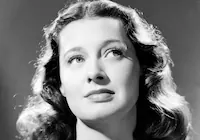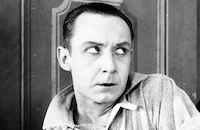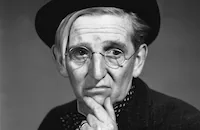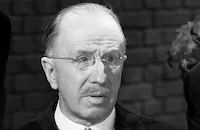Christmas in July

Brief Synopsis
Cast & Crew
Preston Sturges
Dick Powell
Ellen Drew
Raymond Walburn
Alexander Carr
William Demarest
Film Details
Technical Specs

Synopsis
Jimmy MacDonald, a twenty-dollar-a-week clerk at the Baxter Coffee Company, refuses to marry his sweetheart, Betty Casey, until he prospers. To realize his dream, Jimmy, an inveterate contest entrant, submits a slogan to the Maxford Coffee Contest: "If you can't sleep at night, it's not the coffee, it's the bunk." The winner of the contest is supposed to be announced on Maxford's radio program, but when Bildocker, one of the jury contest members, deadlocks the vote by refusing to go along with the slogan selected by the other twelve members, the program has to end without revealing the winning slogan. The next day, three of Jimmy's friends, Tom, Dick and Harry, decide to play a practical joke on him by making up a phony telegram informing him that he has won the $25,000 first prize. When the telegram is delivered to Jimmy's desk at work, Jimmy, Betty and the entire office start to celebrate, and before his friends can tell him that the telegram is just a prank, Jimmy telephones his mother with the good news. Mr. Baxter, thinking that Jimmy's ideas must be good, promotes him to the advertising department. Because the telegram has instructed Jimmy to go to the Maxford company to pick up his prize, Jimmy and Betty innocently go to the office of Dr. Maxford, the head of the company. Because Maxford is frustrated and angry that no winner was selected in time for the broadcast and can't reach any of the contest jurors by telephone, he thinks that Jimmy's slogan was selected as the winner and signs the first prize check. Jimmy then goes to a department store where he uses the check as collateral to buy Betty an engagement ring, his mother a fancy new "Devanola" couch and gifts for everyone on their block. Jimmy and Betty think that their troubles are at an end, as the entire neighborhood celebrates their good fortune, but meanwhile, Maxford discovers his mistake and stops payment on the check. Everyone's "Christmas in July" celebration is interrupted when representatives from the department store arrive to reclaim their merchandise and Maxford appears, tears up his check and denounces Jimmy. The department store decides to let the neighbors keep their gifts and blames everything on Maxford and a near riot erupts. As Jimmy is comforted by Betty, Tom, Dick and Harry arrive, carrying a broken-down couch for Jimmy's mother, which they remorsefully offer as an apology for the prank. Jimmy's downfall appears complete when he goes back to Baxter's to see the new office which has been prepared for him and Baxter threatens to demote him, but Betty convinces him to give Jimmy a chance. As they go home, Jimmy admits that he only had confidence in himself because he won the contest and does not know if he can do a good job in the ad department. Just at that moment, however, Bildocker rushes into Maxford's office and announces that he finally has convinced the rest of the contest jury to admit that his favorite slogan should be the winner. Bildocker then reads the winning entry: "If you can't sleep at night, it's not the coffee, it's the bunk." As Maxford screams, Bildocker expresses his admiration for the slogan and says that they just sent a telegram to the winner, Jimmy MacDonald.

Director

Preston Sturges
Cast

Dick Powell

Ellen Drew

Raymond Walburn
Alexander Carr

William Demarest

Ernest Truex

Franklin Pangborn
Harry Hayden
Rod Cameron
Michael Morris
Harry Rosenthal
Georgia Caine
Ferike Boros
Torben Meyer
Julius Tannen
Alan Bridge
Lucille Ward
Kay Stewart
Vic Potel
George Anderson
Frank Moran
Sheila Sheldon
Esther Michelson

Jimmy Conlin

Robert Warwick
Dewey Robinson

Arthur Hoyt
Walter Soderling
Gus Reed
Ned Norton
Harry Hollingsworth
Frank O'connor
Stanley Mack
Sam Ash
Pat West
C. L. Sherwood

Preston Sturges
Fred Toones
Dorothy Thompson
Cheryl Walker
Eileen Mcavoy
Norah Gale
Bob Mayo
Alice Thomas
Hazel Marshall
Crew
Bart Adams
Harriet Altland
Walter Bradfield
Richard Brandow
Ray Cossar
Hans Dreier
Frank Dugas
George Dutton
Bob Ewing
Murray Foster
George Gottleber
Bert Granger
Earl Hedrick
David Hire
Ellsworth Hoagland
Paul Jones
Joe Kaplan
Floyd Knudtson
Roy Kreuger
Sigmund Krumgold
Ernst Laemmle
Oscar Lau
William Lebaron
Harry Lindgren
Victor Milner
Hedvigh Mjourd
Talmadge Morrison
Ralph Nelson
Lorne Netten
Walter Oberst
Cora Palmatier
Ted Powell
Guy Roe
Preston Sturges
E. C. Sullivan
George "dink" Templeton
Wally Westmore

Videos
Movie Clip




Trailer
Hosted Intro
Film Details
Technical Specs

Articles
Christmas In July - Christmas in July
Christmas in July (1940) was Preston Sturges' second feature film and was completed just before the director's career entered the fast track to success with his subsequent feature, The Lady Eve (1941). In many ways the film shares key similarities to other Sturges' films with its sharp satire of American materialism and its love for eccentric characters, but the tone is closer to the movies of Frank Capra and straddles a fine line between sunny optimism and hopeless pessimism.
Christmas in July celebrates an American dream that is still popular today - that of winning a fortune and discovering overnight fame. But as experienced by the naive Jimmy MacDonald, the price of success is an ambiguous one. His excitement over winning the contest isn't simply about the money; it's about self-worth, something a lot of people lacked in the demoralizing atmosphere of the Depression years. As Jimmy says, "To be poor and unknown one minute, and to be sitting on top of the world the next minute, that's a feeling nobody can ever take away from me." Even more important to Jimmy is the fact that he won the contest for his originality - "You see, I used to think maybe I had good ideas...but now I know it!" Of course, the irony is that Jimmy doesn't yet realize that the congratulations telegram is a hoax. Nevertheless, his unlikely winning jingle for the Maxford Coffee Company - "If you can't sleep, it's not the coffee, it must be the bunk" - has a resonance no one could have foreseen.
Sturges began adapting Christmas in July for the screen while working on his debut feature, The Great McGinty (1940). The script was based on his original three act play, A Cup of Coffee, which was originally purchased by Universal; it was the project that first brought Sturges to Hollywood. Luckily, Paramount was able to secure the rights from their rival studio and Sturges went to work writing specific parts for his favorite characters actors, an ensemble that included William Demarest, Harry Rosenthal, Byron Fougler, Arthur Hoyt, Franklin Pangborn, Jimmy Conlin and numerous others. For leading actor Dick Powell, Christmas in July was quite a departure from his usual roles in that he wasn't required to croon any songs. While he still played a variation of the happy-go-lucky chorus boy that was his trade in the Warner Brothers musicals, he also revealed a flip side to that character, one who could sink into the blackest despair over his poverty-ridden existence.
During the course of its filming, Christmas in July went through various titles changes - from A Cup of Coffee to The New Yorkers to Something to Shout About before its final naming. The filming went fairly smoothly, but according to writer Rob Edelman in MaGill's Survey of Cinema, "Paramount...went to great expense to produce a still photograph that hangs in a wall moulding in Betty Casey's apartment. The shot is of Hester and Essex Streets circa 1900. A group in period dress (including character actors Richard Denning, William Frawley, Jean Cagney, Lillian Cornell, and Douglas Kennedy, who are not in the film) is pictured in and around a gasoline buggy. It took an entire morning to shoot and cost Paramount a day's salary for more than a score of actors and technicians. Also, Sturges uses an Alfred Hitchcock trick when he plays a bit part in his film, as a man having his shoes shined at the beginning."
The director did run into a little trouble with the censors at the Hays Office over some dialogue in his script of Christmas in July. They demanded that several lines be omitted or revised; "God rest his soul" (uttered in the film by an Irish mother) was changed by Code administrator Joseph I. Breen to "May his dear soul rest in peace" and "schlemiel" was substituted with "schnook" in an attempt to avoid what is now known as racial profiling. Sturges did manage to have the last laugh though. In Madcap: The Life of Preston Sturges, author Donald Spoto wrote that the director managed "to retain an amusing shot in the early part of the film, an intercut from Powell and (Ellen) Drew on the rooftop to two snuggling rabbits in a corner cage. This particular visual allusion had been attempted by filmmakers and rejected by censors so often that virtually no director bothered to try to include it any longer. At the preview screening, however, someone nodded and it remained, to the censors' later chagrin."
When Christmas in July went into general release, it was warmly received by critics and audiences alike. The Hollywood Reporter labeled it "a ten-strike for Sturges as a writer-director." Time magazine wrote, "As director, Sturges converted this unpretentious plot into a happy, slightly noisy comedy with a Chaplinesque background of pathos....A good dramatist, Sturges kept his characters credible by the simple but neglected technique of letting them act like people." While Christmas in July is just a warm-up for Sturges' best comedies, it strikes a wonderful balance between the director's urban sophistication and his compassion for the "common man." Producer: Paul Jones
Director/Writer: Preston Sturges
Cinematography: Victor Milner
Editing: Ellsworth Hoagland
Music: Sigmund Krumgold
Art Direction: Hans Dreier, A. Earl Hedrick
Cast: Dick Powell (Jimmy MacDonald), Ellen Drew (Betty Casey), Raymond Walburn (Dr. Maxford), Alexander Carr (Schindel), William Demarest (Bildocker), Ernest Truex (Mr. Baxter), Franklin Pangborn (The Announcer), Harry Hayden (Mr. Waterbury), Rod Cameron (Dick), Harry Rosenthal (Harry), Georgia Caine (Mrs. MacDonald).
BW-67m.
by Jeff Stafford

Christmas In July - Christmas in July
Ellen Drew, 1914-2003
She was born Esther Loretta "Terry" Ray on November 23, 1914, in Kansas City, Missouri. The daughter of a barber, her family moved to Chicago when she was still an infant and she lived a very quiet childhood far removed from the glamour of Hollywood. She was encouraged by some friends to enter a beauty contest when she was just 17. After winning, she tried her luck in Hollywood, but found that they were no immediate offers for her particular talents.
She eventually took a waitressing job at C.C. Brown's, a famed Hollywood Boulevard soda fountain, and had virtually abandoned her dreams as a starlet when William Demarest, a popular actor's agent and well-known character actor, spotted her. Demarest arranged a screen test for her at Paramount, and she was promptly placed under contract for $50 a week.
For the first few years, (1936-38), Drew got only bit parts, and was often uncredited. When she finally got prominent billing in the Bing Crosby musical Sing You Sinners (1938), she decided to change her name, from Terry Ray to Ellen Drew. She earned her first major role in Frank Lloyd's If I Were King (1938) opposite Ronald Colman, yet for the most part of her career, rarely rose above "B" material and second leads. Still, she had some fine exceptions: Preston Sturges' enchanting comedy Christmas in July (1940), with Dick Powell; Tay Garnett's lighthearted war romp My Favorite Spy (1942) co-starring Kay Kyser; Julien Duvivier's taut The Imposter (1944), holding her own with a brooding Jean Gabin; and Mark Robson's chilling low-budget chiller Isle of the Dead (1945) opposite Boris Karloff. Drew made some notable television appearances in the late '50s including Perry Mason and The Barbara Stanwyck Show, before retiring from the entertainment industry. She is survived by her son David; five grandchildren; and five great-grandchildren.
by Michael T. Toole
Ellen Drew, 1914-2003
Quotes
If you can't sleep, it isn't the coffee. It's the bunk.- Jimmy MacDonald
Officer, I want all these people arrested.- Mr. Shindel
Who do you think you are, Hitler?- Patrolman Murphy
Well that sounds very deep dish and high falutin'.- J.B. Bakter
Trivia
The working title of this film was "A Cup Of Coffee".
Preston Sturges wrote the play, "A Cup of Coffee" in 1931, but it was produced off-Broadway in New York in 1988.
The set to this movie was open because Sturges loved visitors to observe what he was shooting.
Sturges helped invent the gadget sofa demonstrated in the department store scene.
Notes
The working titles of this film were The New Yorkers, Something to Shout About and A Cup of Coffee. The film was based on Preston Sturges' play, A Cup of Coffee, which was written in 1931, but was not produced until 1988 in New York. According to materials contained in the Preston Sturges Papers at the UCLA Library, in late 1934, Universal hired Sturges to direct a film based on the play, but that project never materialized. Modern sources note that the project was delayed because of financial turbulence at the studio. Sturges was asked to doctor a script for a film biography of Diamond Jim Brady (released in 1935 as Diamond Jim), and by the time he was finished, his mentor at Universal, producer Henry Henigson, had moved to Paramount. With Henigson's departure, Sturges' script languished at Universal until he moved to Paramount and convinced the studio to buy his script for $6,000. News items in Hollywood Reporter note that Betty Field and William Holden were originally slated for the lead roles in the film and Arthur Hornblow, Jr. was to have produced. In 1944, Dick Powell and Linda Darnell starred in a Lux Radio Theatre version of the Sturges' story and in 1954, NBC presented a televised version of the story on The Lux Video Theatre. Modern sources add the following names to the cast: Arthur Stuart Hull (Cashier); George Renavent (Sign painter); January Buckingham (Secretary); Charles Moore (Porter).

Miscellaneous Notes
Released in United States 1940
Released in United States 1974
Released in United States on Video July 12, 1990
Re-released in United States on Video June 30, 1993
Released in United States 1940
Released in United States 1974 (Shown at FILMEX: Los Angeles International Film Exposition (The Preston Sturges Movie Marathon) March 28 - April 9, 1974)
Re-released in United States on Video June 30, 1993
Released in United States on Video July 12, 1990















